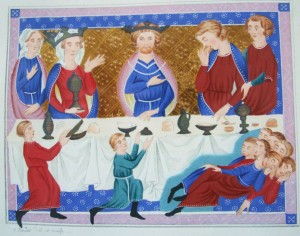
While researching my manuscript, GODWINE KINGMAKER, I bumped into a comment dropped by E.A. Freeman. He was talking about King Harthacnut’s accusation that Godwine was responsible for the murder of Alfred Aetheling. Speaking of the trial, Freeman mentioned “compurgation…was looked on as the most effectual proof of innocence.” I glanced over this passage then stopped short and had to go back. Compurgation? What is that?
Well, it turns out that Trial by Compurgation was the most common method used in the Middle Ages to determine the innocence of an accused. Also called “Wager of Law”, this method was actually used in some forms of civil cases all the way into the 19th century. Here’s what it entails: the accused party takes an oath of innocence. Then he calls forth a predetermined number of “oath-helpers” (or compurgators), usually 11 or 12 friends or neighbors, who are prepared to declare that they believe he is telling the truth. These oath-helpers aren’t required to have any specific knowledge of the crime; they are more like character witnesses who could be held responsible if the accused profited from his freedom. The higher the status of the oath-helper, the more weight their opinions held.
According to Freeman, “Godwine asserted his own innocence on oath, and his solemn plea of Not Guilty was confirmed by the oaths of most of the Earls and chief Thegns of England…Godwine’s acquittal was as solemn as any acquittal could be. All the chief men of England swore to their belief in his innocence.” (Vol. 1 p.510, History of the Norman Conquest.)
If a defendant did not have access to compurgators, he could be required to submit to an old-fashioned Trial by Ordeal: Ordeal of Fire (remember Emma of Normandy and the burning ploughshares), Ordeal of Boiling Water, Ordeal of Cold Water, and of course plenty of variations depending on the will of the arbitrator. These make Trial by Compurgation rather tame by comparison!
In the end, it would seem that Godwine’s innocence was not believed by everyone, as the stigma of Alfred’s death dogged him until the end. In fact, during his last meal with the King, the story goes that Godwine declared that he should choke on a piece of bread if he was guilty…and of course, that’s just what happened. (No, Godwine is my hero and I don’t believe this propaganda!)